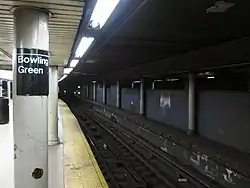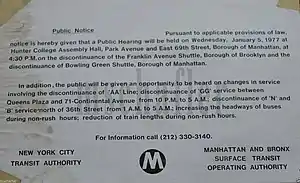.svg.png.webp) Bowling Green/South Ferry Shuttle | ||||||||||||||||||||||||||||||||||||||||||||||||||||||||||||||||||||||||||||||||||||||||||||||||||||||||||||||||||||||||||||||||||||||||||||||||||||||||||||||||||||||||||||||||||||||||||||||||||||||||||||||||||||||||||||||||||||||||||||||||||||
 Boarded up shuttle platform on the right at Bowling Green station. | ||||||||||||||||||||||||||||||||||||||||||||||||||||||||||||||||||||||||||||||||||||||||||||||||||||||||||||||||||||||||||||||||||||||||||||||||||||||||||||||||||||||||||||||||||||||||||||||||||||||||||||||||||||||||||||||||||||||||||||||||||||
| Northern end | Bowling Green | |||||||||||||||||||||||||||||||||||||||||||||||||||||||||||||||||||||||||||||||||||||||||||||||||||||||||||||||||||||||||||||||||||||||||||||||||||||||||||||||||||||||||||||||||||||||||||||||||||||||||||||||||||||||||||||||||||||||||||||||||||
|---|---|---|---|---|---|---|---|---|---|---|---|---|---|---|---|---|---|---|---|---|---|---|---|---|---|---|---|---|---|---|---|---|---|---|---|---|---|---|---|---|---|---|---|---|---|---|---|---|---|---|---|---|---|---|---|---|---|---|---|---|---|---|---|---|---|---|---|---|---|---|---|---|---|---|---|---|---|---|---|---|---|---|---|---|---|---|---|---|---|---|---|---|---|---|---|---|---|---|---|---|---|---|---|---|---|---|---|---|---|---|---|---|---|---|---|---|---|---|---|---|---|---|---|---|---|---|---|---|---|---|---|---|---|---|---|---|---|---|---|---|---|---|---|---|---|---|---|---|---|---|---|---|---|---|---|---|---|---|---|---|---|---|---|---|---|---|---|---|---|---|---|---|---|---|---|---|---|---|---|---|---|---|---|---|---|---|---|---|---|---|---|---|---|---|---|---|---|---|---|---|---|---|---|---|---|---|---|---|---|---|---|---|---|---|---|---|---|---|---|---|---|---|---|---|---|---|---|---|---|---|---|---|---|---|---|---|---|---|---|---|---|---|---|---|
| Southern end | South Ferry (inner loop) | |||||||||||||||||||||||||||||||||||||||||||||||||||||||||||||||||||||||||||||||||||||||||||||||||||||||||||||||||||||||||||||||||||||||||||||||||||||||||||||||||||||||||||||||||||||||||||||||||||||||||||||||||||||||||||||||||||||||||||||||||||
| Stations | 2 | |||||||||||||||||||||||||||||||||||||||||||||||||||||||||||||||||||||||||||||||||||||||||||||||||||||||||||||||||||||||||||||||||||||||||||||||||||||||||||||||||||||||||||||||||||||||||||||||||||||||||||||||||||||||||||||||||||||||||||||||||||
| Rolling stock | R12 | |||||||||||||||||||||||||||||||||||||||||||||||||||||||||||||||||||||||||||||||||||||||||||||||||||||||||||||||||||||||||||||||||||||||||||||||||||||||||||||||||||||||||||||||||||||||||||||||||||||||||||||||||||||||||||||||||||||||||||||||||||
| Started service | February 1909 | |||||||||||||||||||||||||||||||||||||||||||||||||||||||||||||||||||||||||||||||||||||||||||||||||||||||||||||||||||||||||||||||||||||||||||||||||||||||||||||||||||||||||||||||||||||||||||||||||||||||||||||||||||||||||||||||||||||||||||||||||||
| Discontinued | February 13, 1977 | |||||||||||||||||||||||||||||||||||||||||||||||||||||||||||||||||||||||||||||||||||||||||||||||||||||||||||||||||||||||||||||||||||||||||||||||||||||||||||||||||||||||||||||||||||||||||||||||||||||||||||||||||||||||||||||||||||||||||||||||||||
| ||||||||||||||||||||||||||||||||||||||||||||||||||||||||||||||||||||||||||||||||||||||||||||||||||||||||||||||||||||||||||||||||||||||||||||||||||||||||||||||||||||||||||||||||||||||||||||||||||||||||||||||||||||||||||||||||||||||||||||||||||||
The Bowling Green–South Ferry shuttle was a shuttle service of the New York City Subway system that operated between Bowling Green and the inner loop platform at South Ferry. It operated to provide South Ferry service for IRT Lexington Avenue Line riders during hours when the 5 service did not stop at South Ferry (during the daytime on weekdays, and at first, also late nights). Because the inner loop station that the shuttle used at the South Ferry station was on such a tight curve, there was no continuous platform; instead four openings in the tunnel wall led into the station. Four R12 cars that were used on the shuttle, 5703–5706, were modified and equipped so that only the center door of each car would open at one of the open spaces.
History

The shuttle was first operated in February 1909 to allow all rush hour trains to go to Brooklyn; the shuttle only operated during rush hours. Formerly, all Broadway express trains had terminated at South Ferry, with all Lenox Avenue express trains through to Brooklyn. Locals all ended at City Hall.[1][2]
In August 1964, the Low-Voltage cars that were in service on the shuttle were replaced with R12s, which had their door circuits modified so that only the doors which aligned with the portals would open.[2]
In 1967, the Bowling Green–South Ferry shuttle and all others in the New York City Subway system was given the label SS.
The New York City Transit Authority decided that the shuttle was more trouble to operate than the benefit it provided. At midnight between February 12 and 13, 1977, the Bowling Green shuttle was discontinued without replacement. Since then, IRT Lexington Avenue Line passengers have had to walk a relatively short distance from Bowling Green station in order to access South Ferry and the Staten Island Ferry terminal.[2][3]
In August 1989, the MTA proposed linking the Bowling Green platform to the Whitehall Street station of the BMT Broadway Line and the South Ferry station of the IRT Broadway–Seventh Avenue Line.[4] The two latter stations were connected in 2009.[5] Since 2007,[6] there has been an entrance to the Bowling Green station in front of the Alexander Hamilton U.S. Custom House (now the George Gustav Heye Center), just around the corner from two entrances to the Whitehall Street station (which are set into the building's eastern elevation).[7]
See also
References
- ↑
- "Shuttle Trains in Subway". The New York Times. May 27, 1908. p. 5. Retrieved July 18, 2010.
- "Want to Run Shuttle Trains". The New York Times. June 7, 1908. p. 18. Retrieved July 18, 2010.
- "Shuttle Service in Subway". The New York Times. February 25, 1909. p. 11. Retrieved July 18, 2010.
- "Annual report. 1908/09-1919/20". HathiTrust. Interborough Rapid Transit Company. Retrieved September 6, 2016.
- 1 2 3 Cunningham, Joseph; DeHart, Leonard O. (January 1, 1993). A History of the New York City Subway System. J. Schmidt, R. Giglio, and K. Lang.
- ↑ "M.T.A. Expected to Save Franklin Avenue Shuttle, Once an Austerity Target". The New York Times. February 10, 1977. p. 27. Retrieved July 18, 2010.
- ↑ "The Bulletin". The Bulletin. New York Division Electric Railroaders' Association: 1. August 1989.
- ↑ Donohue, Pete (March 17, 2009). "MTA opens new $530M South Ferry station, easing commuters' hassle". New York Daily News. Retrieved June 3, 2022.
- ↑ "Lower Manhattan : Bowling Green Elevator Installation". lowermanhattan.info. July 11, 2007. Archived from the original on October 15, 2007. Retrieved March 27, 2020.
- ↑ "Bowling Green Neighborhood Maps". mta.info. Metropolitan Transportation Authority. September 2018. Archived from the original on January 29, 2020. Retrieved May 27, 2019.